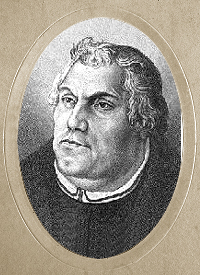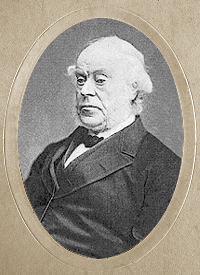A Mighty Fortress Is Our God
BIBLE REFERENCE:
The LORD of hosts is with us; the God of Jacob is our refuge. Selah.
Psalms 46:7
To the chief Musician for the sons of Korah, A Song upon Alamoth.
"God is our refuge and strength", a very present help in trouble.
Psalms 46:1
Therefore will not we fear, though the earth be removed, and though the mountains
be carried into the midst of the sea;
Psalms 46:2
Come, behold the works of the LORD, what desolations he hath made in the earth.
Psalms 46:8
Though the waters thereof roar and be troubled, though the mountains shake with the swelling thereof. Selah.
Psalms 46:3
There is a river, the streams whereof shall make glad the city of God, the holy place of the tabernacles of the most High.
Psalms 46:4
God is in the midst of her; she shall not be moved: God shall help her, and that right early.
Psalms 46:5
The heathen raged, the kingdoms were moved: he uttered his voice, the earth melted.
Psalms 46:6
He maketh wars to cease unto the end of the earth; he breaketh the bow, and cutteth the spear in sunder; he burneth the chariot in the fire.
Psalms 46:9
Be still, and know that I am God: I will be exalted among the heathen, I will be exalted in the earth.
Psalms 46:10
Martin Luther - Lyrics and Composer
1483-1546
Born: November 10, 1483, Eisleben, Germany.
Died: February 18, 1546, Eisleben, Germany.
Buried: Schlosskirche, Wittenberg, Germany
Frederic Henry Hedge - Translated Hymn to English
1805-1890
Born: December 12, 1805, Cambridge, Massachusetts.
Died: August 21, 1890, Cambridge, Massachusetts.
HYMN HISTORY:
Martin Luther was born on November 10,1483 in Eisleben, Saxony, Germany. He was educated at the University of Erfurt.
On October 31, 1517, sometimes called the “4th of July of Protestantism,” Martin Luther nailed his ninety-five theses to the door of the Cathedral of Wittenberg, Germany.
These theses condemned various practices and teachings of the Roman church. After several years of stormy disputes with the Pope and other church leaders, Martin Luther was finally excommunicated from the fellowship of the Roman Catholic church in 1520.
One of the important benefits of the Reformation Movement was the rediscovery of congregational singing. Luther had strong convictions about the use and power of sacred music. He expressed his convictions in this way,
“If any man despises music, as all fanatics do, for him I have no liking; for music is a gift and grace of God, not an invention of men. Thus it drives out the devil and makes people cheerful. Then one forgets all wrath, impurity and other devices,”
Again, “The Devil, the originator of sorrow anxieties and restless troubles, flees before the sound of music almost as much as the Word of God.”
In another place, “I wish to compose sacred hymns so that the Word of God may dwell among the people also by means of songs.”
Finally, Luther wrote, “I would allow no man to preach or teach God’s people without a proper knowledge of the use and power of sacred song.”
The single most powerful hymn of the Protestant Reformation Movement was Luther’s “A Mighty Fortress Is Our God,” based on Psalm 46. This hymn became the
battle cry for the people, a great source of strength and inspiration even for those who were martyred for their convictions. The hymn was based on Psalm 46, a psalm written in response to God’s delivering His people from severe calamity and trial. Psalm 46 begins with,
“God is our refuge and strength, a very present help in trouble. Therefore we will not fear.”
It then describes a event in which the city of Jerusalem was under siege by enemy armies, using pictures of the earth shaking and mountains falling and
waters flooding to express how dire the situation was. Then the psalmist describes how, though the Israelites could do nothing in their own power, God was with His people and He could not be shaken nor moved and He won the victory.
The final stanza of the psalm looks ahead to the future when God shall defeat all armies and establish his eternal reign. It presents God as the conqueror who is the one and only victorious and sovereign God. Therefore He tells us:
“be still and know that I am God”
Martin Luther’s “A Mighty Fortress Is Our God” has often been called the “Battle Hymn of the Reformation” and has been translated into almost every known language.
It was perhaps the single most powerful hymn of the Reformation, as it was a great source of strength and inspiration for those who were persecuted and even martyred for their convictions.
Martin Luther used Psalm 46 as the inspiration for “A Mighty Fortress Is Our God.” Luther’s four stanzas interpret this psalm from his own experience during the troubled times of the Reformation.
He interpreted the psalm to be not merely expressing God’s protection and strength for God’s people of Jerusalem, but for God’s people of all times. And he understood the battle described in the psalm to be more than an earthly battle but a spiritual battle.
So Luther saw in Psalm 46 a great encouragement for him and the Reformers that God would be a strong refuge and strength for them in their current time of trouble—a battle against not merely fleshly armies but in the realm of spiritual warfare as they defended the Gospel itself.
James Montgomery Boice wrote:
“Almost everyone associates Martin Luther with the Book of Romans, particularly Romans 1:17, “The just shall live by faith”. We tend to forget that Luther was converted not only by his
study of Romans, but also by his study of the psalms. Luther taught the psalms for years and loved them very much, even late in life. His favorite was Psalm 46. It is said of Luther that there were times during the dark and dangerous periods of the Reformation when he was terribly
discouraged and depressed. But at such times he would turn to his friend and coworker Philipp Melanchthon and say, “Come, Philipp, let’s sing the forty-sixth Psalm.” Then they would sing it in Luther’s own strong version…. We know it as “A Mighty Fortress Is Our God.”
Luther said,
"We sing this psalm to the praise of God, because God is with us and powerfully and miraculously preserves and defends his church and his word against all fanatical spirits,
against the gates of hell, against the implacable hatred of the devil, and against all the assaults of the world, the flesh and sin.”
This hymn has been translated into practically every known language and is regarded as one of the noblest and most classic examples of Christian hymnody. It is said there are no less than sixty translations of this text in English alone.
In England the version by Thomas Carlyle is in general use, while in this country the translation by Frederick H. Hedge, a professor at Harvard University, is used most frequently. This translation was not made until 1852 and first appeared in a book entitled Gems of German Verse by W. H. Furness, published in 1853.
Hedge attended Harvard University and Divinity School, then pastored in Arlington, Massachusetts (1829-1835); Bangor, Maine (1835-1850); Providence, Rhode Island (1850-1856); and Brookline, Massachusetts (1856-1872). He edited The Christian Examiner (1857-1861), and served as president of the American Uitarian Association (1859-1862).
He went on to teach ecclesiastical history (1857-1878) and German literature (1872-1882) at Harvard.
Martin Luther died on February 18, 1546, in Eisleben, Germany, and is buried at Schlosskirche, Wittenberg, Germany. The first line of this national hymn of Protestant Germany is fittingly inscribed on the tomb of the great reformer at Wittenberg, and may still be read with appreciation by travellers to that historic spot.
Dear Brothers and Sisters in Christ,
Like
Psalm 46
, the hymn "A MIghty Fortress Is Our God", begins by proclaiming that God is our refuge (a fortress is a military fort or a fortified place) and strength (a bulwork is a wall of defense or even a shield).
The Lord is our constant source for help in time of trouble—even when trials seem to be flooding over us. But then our great adversary is mentioned as our greatest threat who still strives to do us harm.
He—Satan—is clever and powerful and filled with hate. And on earth Satan has no equal.
(1 Peter 5:8)
The second stanza, however, makes it clear that though we cannot win the spiritual battle by our own strength
(Ephesians 6:11-12),
God has provided us with the One who can and will win the battle. And that One is none other than the Lord Jesus Christ. His name is “Lord Sabaoth”, which means “Lord Almighty”, “Lord of Hosts” or even “Lord of Armies”. Luther is referring to
Psalm 46:7 and 11,
in which God is named the Lord of Hosts. This means the Lord of Armies—meaning both earthly armies and the Lord’s angelic armies (see
2 Kings 6:15,
where Elisha prayed that his servant’s eyes would be opened to see the hosts protecting them). The point being that the Lord over all spiritual hosts is the Man—Jesus Christ—who will win the spiritual battle. Note that Luther also is making a clear proclamation of Christ’s deity by both calling him Lord Almighty and saying He is the same from age to age
(He is eternal—the same yesterday, today, and forever—
Heb 13:8
).
The third stanza expresses that though the demonic forces against us are great, we have no need to fear because our God has willed that His truth would triumph through us. And though Satan is ferociously evil, we can endure his anger because we know he is a defeated foe.
Our Lord is infinitely greater! So much so that “one little word” uttered from our Lord will ruin him. (
Psalms 46:6
says
“He uttered His voice, the earth melted”.
The final stanza uses a play on words—
“word”
was used in the last line of stanza three and now
“Word”
is used to represent Christ. Christ is above all earthly powers and is there for us. Also, God—who is on our side—has given us His Spirit and His gifts. So we have nothing to fear and nothing to lose! The evil one may be allowed to take our earthly goods and family
(“goods and kindred”). He may even be allowed to take our earthly life! But the worst the enemies of truth can do is really nothing. They are all perishing. But the Lord, His truth, His kingdom, and all those who belong to Him will endure forever.
Therefore, as
Psalm 46
concludes:
Be still, and know that I am God; I will be exalted among the nations, I will be exalted in the earth!
The LORD of hosts is with us; The God of Jacob is our refuge.
A Hymn and its History is a ministry that depends solely upon the Lord for his
guidance. Please help us to continue to
touch lives and bring blessings to many others 24 hours a day all over the world.
If you have been blessed by this Ministry
please give a donation as the Lord
lays it upon your heart, and share in the Blessings. By investing in the
lives of
others you will reap benefits that will last for all eternity.
|
_______________________________________________________________________________________________
_______________________________________________________________________________________________
_______________________________________________________________________________________________
_______________________________________________________________________________________________
_______________________________________________________________________________________________




